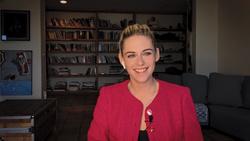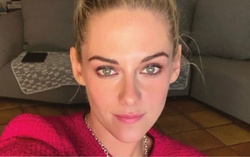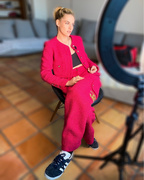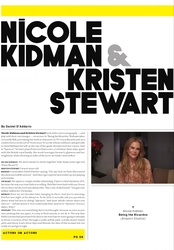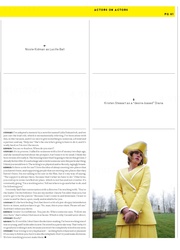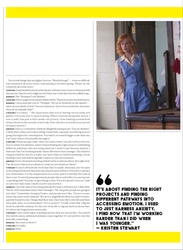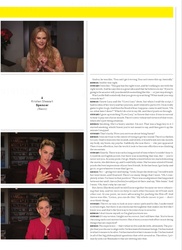Title : Vdeo: Kristen and Nicole Kidman's Variety 'Actors on Actors' interview
link : Vdeo: Kristen and Nicole Kidman's Variety 'Actors on Actors' interview
Vdeo: Kristen and Nicole Kidman's Variety 'Actors on Actors' interview
Digital Scans
Nicole Kidman (“Being the Ricardos”) and Kristen Stewart (“Spencer”) sat down for a virtual chat for Variety’s Actors on Actors, presented by Amazon Studios. For more, click here.
Nicole Kidman and Kristen Stewart both delve into iconography — and play with their own images — on screen. In “Being the Ricardos,” Kidman takes on Lucille Ball, portraying her both in character as TV’s Lucy Ricardo and as a creative force on the set of “I Love Lucy.” It’s a role whose resilience and grit calls to mind Kidman herself, at the top of her game decades into her career. And in “Spencer,” Stewart plays Princess Diana over a turbulent three days spent with the British royal family. Her work leverages Stewart’s glamour and her toughness, while showing us sides of the actor we hadn’t seen before.
NICOLE KIDMAN: We were meant to work together how many years ago [on “Panic Room”]?
KRISTEN STEWART: I was 10 years old.
KIDMAN: I remember David Fincher saying, “Oh, my God, we have discovered the most incredible actress.” And then I got injured and ended up not playing your mama.
STEWART: We spent a couple weeks rehearsing. I have a vivid memory of it, because the way you treat kids is so telling. I felt like I was buds with you. It was two or three weeks, but I was always like, “She’s one of my friends.” You gave me walkie-talkies for Christmas.
KIDMAN: Here we are decades later, hanging in there. And you’re amazing; Fincher was right, as he always is. To be able to actually ask you questions about what led you to doing “Spencer,” and your whole career since you were 10 — tell me about it. You could easily have said no to “Spencer,” but you didn’t. Why?
STEWART: This was not something that I overthought, because as soon as you start picking this one apart, it’s easy to find reasons to not do it. The way that Pablo Larraín had presented the idea to me was that we were going to attempt to know a version of her through a really selfish path, a really desire-based path, and shove it into three days and liberate the idea of this woman but not really try and get it right.
And so, he was like, “You can’t get it wrong. You can’t mess this up, basically.”
KIDMAN: And he was right.
STEWART: I was like, “This guy has the right voice, and he’s talking to me with the right words. And he says this is a great idea and that he believes in me.” If you’re going to be an actor still, you should do something like this — or just stop doing it.
Was Lucille Ball somebody that you grew up watching? What made you step towards her?
KIDMAN: I knew Lucy and the “I Love Lucy” show, but when I read the script, I had no idea of her story and her journey, and I related to parts of it. I was really game to give it a go. And then the flood of fear, I suppose, came in and I went, “Oh no, what have I done?” Which I do a lot in my life, and then I push on through.
STEWART: I grew up watching “I Love Lucy,” so I know that voice. It was so surreal to hear it pop out of your mouth. There’s a less-rehearsed version of that voice, when she’s just being a human.
KIDMAN: Smoking. She’s a heavy smoker. I’m not. That was a huge key to it. I started smoking, which I know you’re not meant to say, and then gave it up the minute I stopped.
STEWART: That’s lucky. Were you nervous about being funny?
KIDMAN: I was nervous to the extent of trying to get her sound. There’s a rhythm to Lucy. I had to lean into the sounds, and slowly, it would wash into my mouth, my body, my brain, my psyche. Suddenly she was there — she just appeared. Then it was effortless, but the work it took to become effortless was climbing the mountain.
STEWART: Exactly. There was such a long period of time where I couldn’t hear it. I could do an English accent, but there was something that was, like — you’re never not you. At some point, I let go. Maybe a week before we started shooting the movie, she did show up, and I could fully relate. She became a kind of friend; you do the best impressions of your best friends. At the last hour, I got lucky and got it, or got whatever it was that I got to.
KIDMAN: Yes — giving over and saying, “Gosh, I hope she shows up.” I would watch her interviews, and I learned. There’s so many things that I went, “Oh, I completely relate. I’ve been in that position.” There was an alignment that happened between her and I; Aaron [Sorkin] would just sit there and say, “Mm-hmm.” And I went, “Oh, that’s why he cast me.”
But Javier [Bardem] and I would Zoom together because we were rehearsing that way, and we were no help to each other because we’d freak each other out. At one point, we were advocating for pushing the film off. And Aaron was like, “Listen, you can do this.” My whole career is just — don’t overthink things.
STEWART: There’s no way to look at your career path and be like, I understand a certain logic, but there is an emotional throughline that makes me feel like I know you, and that’s the best way to become close to an actor.
KIDMAN: I don’t know myself, so I’m glad you know me.
STEWART: It’s my version. I might not be correct, but I still have that. You’ve been choosing such cool movies forever. Has it been a concerted effort in not doing things that are expected?
KIDMAN: The experience — that’s what we live and die with, ultimately. The people that you choose to align with. I’m fascinated in human beings. I’m fascinated in what it means to be alive. I’m fascinated in what it means to die. I’m fascinated in all of the big philosophical questions that orbit around us. Therefore, I primarily seek out filmmakers that are delving into that.
I’ve circled things that are lighter fare too. “Moulin Rouge!” — it was so difficult, but I wanted to do a love story. I was putting it out there going, “Please, let me creatively do a love story.”
STEWART: I watched that movie in the theater with my mom. I was so obsessed with that movie. I knew every single word of that one track that was incredibly long.
KIDMAN: The “Elephant Love Medley.”
STEWART: Every single word and probably still do. That was such a beautiful movie.
KIDMAN: I went and saw you in “Twilight.” We sat in Nashville in the theater — what do you think of that? You are luminous. You’re born with that charisma. How do you handle that?
STEWART: It’s funny — the experience that you’re having versus what you gather everyone else is experiencing. When I started doing that movie, I was 17 and I was just a little inside-out person. I was walking around with all my blood on the outside of my body. How old were you when you started acting in movies?
KIDMAN: I was 14. I remember Anthony Minghella saying to me, “You are skinless.” I think that’s what you’re describing. Vulnerable, exposed, everything you are going through is for consumption. You had it on a much bigger scale than me, but I can’t believe I’m actually through it.
STEWART: When you get older, there are times where you feel self-protective. You’re a little less skinless, and it’s about finding the right projects and finding different pathways into accessing emotion. I used to just harness anxiety. I find now that I’m working harder than I did when I was younger. The skinless thing worked for me for a while, but now I have to build something, versus fielding every ball and being fully subject to my environment.
KIDMAN: You’ve directed one thing, which I want to ask you about. But right now: The directors that you are drawn to, why are you drawn to them?
STEWART: It starts off with the work that they’ve made, obviously, but I’m open to working with artists that don’t necessarily have a library of work to convince you. Sometimes, it is the temperature in a room, and it is literally the tone of their voice. It’s worth jumping towards people that you feel like you can tap into something with. You have to give things a shot. Even if it doesn’t turn out, I had to turn over that stone. I had to see if it was worth it.
KIDMAN: I love the idea of not being attached to how it will turn out. I did a film, “Birth,” with Jonathan Glazer that I thought, “Oh, my gosh, people are going to love this.” I remember being in Venice, and people were like, “I’m not so sure about the scene in the bathtub.” But he is a magnificent director, and it’s subsequently found its way. Things find their way; they have their own life and their own path. Now, it’s so immediate: “Is it a success?” I really resist that. I dig my heels in and will continue for the rest of my life to dig my heels in about that. It’s about the long journey artistically.
STEWART: I also really enjoy watching movies that are not perfect. You watch this weird, messy, awkward alchemy come together: It’s not perfect, but this feels like something.
KIDMAN: You want to direct?
STEWART: So badly.
KIDMAN: Wow.
STEWART: I’ve adapted a memoir by a novelist named Lidia Yuknavitch, and we just cast the lead role, which is monumentally relieving. I’ve been alone with this, in this vacuum, and it’s so nice to give something to someone, a friend and a partner, and say, “Help me.” She’s the one who’s going to have to do it, and it’s really hard, so I’m over the moon.
KIDMAN: You are so fearless. When do you start?
STEWART: It’s in process. I talked to someone with a lot of money two days ago, and she seemed excited about the prospect, but I want it to be small. I think the best version of it really is. The freezing water that I’m going to throw this girl into, I already feel terrible. It’s such a huge ask to invite someone onto this particular thing. I think you would love it. The writing is so physical and so fiercely, ragingly female.
KIDMAN: Is there a role for me? I love the idea of always moving into places that you haven’t been, and supporting people that are moving into places that they haven’t been. I’m not asking to be cast in the film, but it’s my way of saying, “The support is always there, because that’s what we have to do.” Otherwise, you end up in some rarefied-air place, which is not fun and not creative. It’s constantly going, “I’m a working actor. Tell me where to go and what to do, and I’m following you.”
I recently had that conversation with a director I’m working with. “You’re the leader; I’m the follower. You are my mother. I know I’m older than you, but you’ve got to be the parent.” Because I can’t come in and dominate. I want to come in and be there, open, ready and available for you.
STEWART: It’s the best feeling. I bet that there’s a bit of a jaw-droppy intimidation factor at times, and you have to go, “No, man, this is your show. Please tell me.” And that’s when you thrive.
KIDMAN: I waver in confidence. You just do. When someone says, “Follow me over here,” that’s when I feel most at home. Which is why I would never direct.
STEWART: Really?
KIDMAN: No. It’s terrible. I don’t have the decision-making. I’ve been working since I was so young, and I’m decades in now. I’m wired in a particular way. That’s why it’s so good you’re doing it now, because you won’t be completely wired in one area.
STEWART: Your wiring is very haphazard — nothing feels rehearsed or planned. It’s so easy to follow you, but it is also like whiplash. Don’t try and make decisions. We love watching you not make them.
Source: Variety Transcript Scans: Gossipgyal
That's the article Vdeo: Kristen and Nicole Kidman's Variety 'Actors on Actors' interview
You are now reading the article Vdeo: Kristen and Nicole Kidman's Variety 'Actors on Actors' interview with link address https://celebxix.blogspot.com/2022/01/vdeo-kristen-and-nicole-kidman-variety.html
